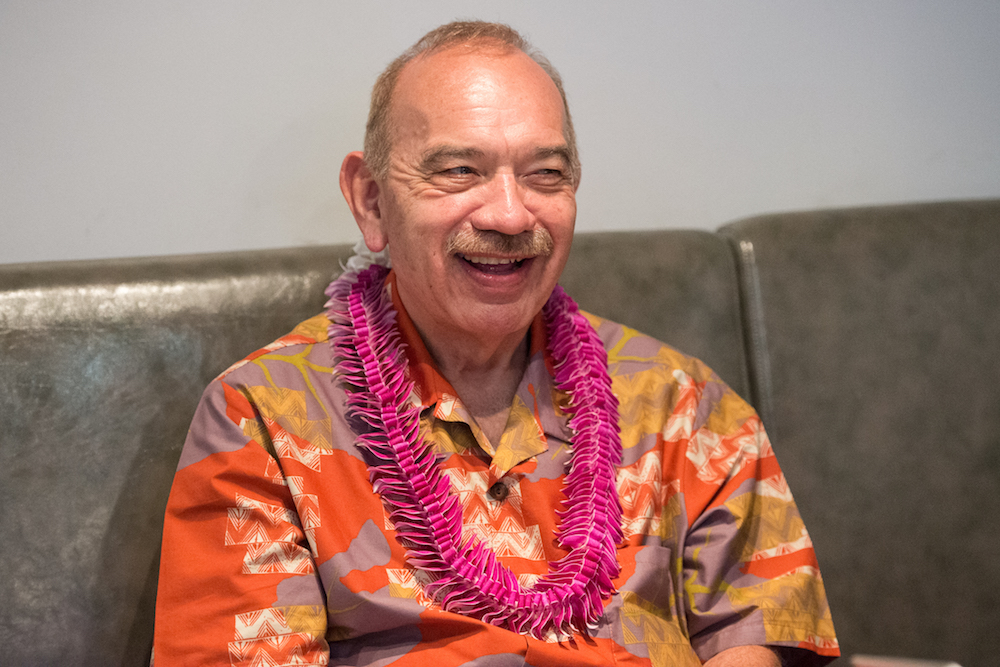
Photo by Joseph Esser.
John David Waiheʻe III is an American politician who served as the fourth governor of Hawai‘i from 1986 to 1994. He was the first American of Native Hawaiian descent to be elected governor of any state in the United States. After his tenure in the governor’s office, Waiheʻe became a nationally prominent attorney and lobbyist. Prior to taking part in a Zócalo/Daniel K. Inouye Institute “Talk Story” event titled “Will Pidgin Survive the 21st Century?,” which took place at Artistry Honolulu in Honolulu, Hawai‘i, Waiheʻe spoke in the green room about working for a beer company, the best book he’s read this year, and the recognition of the Hawaiian language as an official language in the state.
What’s the best book you’ve read in the past year?
The Lion of Cairo, which is a complete fantasy. I find myself, in this day and age, wanting fantasy. You get tired of the news and the articles.
What service project did you complete to earn your Eagle Scout rank?
We cleaned up the park near the school. Eagle Scouts, in this day and age, do things like build the Suez Canal, but we did something simpler, like pick up rubbish. Most people like to do everything else but pick up rubbish, which is probably why I have such a distaste for it.
What’s the strangest job you’ve ever had?
Once, I ran a survey for a beer company that wanted to design a marketing program, and my job was to make sure that they could [fill] two beer buses every night for two weeks. I got to invite all my friends and allow them to get drunk for free.
Where did you go to high school?
I went to a number of schools, actually. I was not a very good student. I was asked to leave a number of schools. In reality, I ended up with two alma maters: one, the Honokaʻa school on the Big Island, and Hawaiian Mission Academy, a boarding school, a private school, here on O‘ahu.
Why was it so important to you to see the Hawaiian language adopted as an official language in Hawai‘i?
For a lot of reasons. I mean, some of it is cultural and emotional, that this was originally a Hawaiian country. But, there were also some very important reasons, one of which Chief Justice Richardson came by and talked to me about, which was the interpretation of old documents, which were written in Hawaiian. And what was happening because Hawaiian was not the official language, it would be translated by essentially government people to English. And the English became the prevailing authority for whatever the document was attempting to guide or rule on. And so that put the native speakers at a tremendous disadvantage. It was just time, I mean, the language had been suppressed for so long that there was an opportunity to just swing the pendulum the other way.
Who was your childhood hero?
If you read comics, it had to be Superman. But my real hero was probably my dad because he just seemed to know what needed to be done whenever something had to happen. And so, I would say he was my hero.
What do you think is the biggest misconception people have about Hawai‘i?
The biggest misconception is that some people think that Hawai‘i is just one big hotel. And it’s not. It’s a very rich place with its own history and culture, and there is something deeper than just ambiance in Hawai‘i. How do I say this? I think there’s a major difference when you deal with public policy and cultural issues on a continent, where there’s a whole lot of space. And you see the same issues on an island, where resources and space are finite. So, what people make assumptions about is that they think that the same formulations or reaction to crises that seems to work in the Midwest would work in Hawai‘i. So, to me, that seems to be the biggest misconception.
What does it take to get you on a dance floor?
Teaching me how to dance. That’s literally true, because every year when I was in office, one of my more delightful duties was I had to dance the opening dance with all the various beauty queens—pageant queens, because they’ve gotten to be [about] much more than just looks. I got to practice with the queen a few times before we actually had to do the dance. I was old enough to have been given school lessons in how to do the waltz and the fox-trot. But most of the people that I was dancing with, all they were used to doing is going on the floor and improvising. So, all of a sudden, we had to do a real structured dance, and we both had to go learn it. It was actually fun. So I guess, yeah, give me dance lessons.
Do you have a favorite Hawaiian pidgin phrase?
Not really. There’re so many. I think my favorite Hawaiian phrase, which was used a lot in pidgin, is “pau.” Because I think the word expresses action. When you say “finish,” it doesn’t quite give you the same sense of finality that “pau” does. So, in terms of pidgin, to me, that is a word that is so universal. And it’s an easy word to say and remember.
What do you do to decompress?
I shoot pool. I used to golf, but shooting pool, you sweat less.



